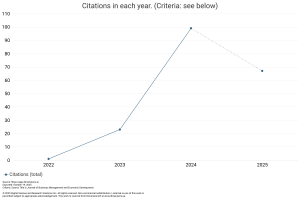Sport Organization Employee Performance: Skills, Creativity and Innovation
DOI:
https://doi.org/10.59653/jbmed.v1i02.149Keywords:
Creativity, Employee performance, Innovation, Hard Skill, Soft SkillAbstract
Good performance can have a tremendous impact on the organization concerned. The favored performance increase does not quickly materialize however calls for a protracted method. Good employee performance will be useful for companies or institutions in achieving their goals. This research is to look at the factors that influence employee performance at KONI Sungaipenuh City. On this have a look at, soft skills have a significant impact on creativity. Likewise, creativity has a significant effect on employee performance and soft skills have a substantial effect on employee performance through creativity. in the meantime, other hypotheses on this take a look at implying that the speculation is rejected or has no widespread impact. The data analysis approach to be able to be used in this examination is to apply a structural equation modeling. SEM offers capabilities for path analysis, the path analysis that will be used in this research is partial least squares (PLS), using Smart PLS 4.0 software. The sample consisted of 42 respondents from the employees of the KONI Sungaipenuh City
Downloads
References
Amabile, T. M. (1988). A model of creativity and innovation in organizations. Research in Organizational Behavior, 10, 123–167.
Anderson, N., Potočnik, K., & Zhou, J. (2014). Innovation and creativity in organizations: A state-of-the-science review and prospective commentary. Journal of Management, 40(5), 1297–1333.
Anggiani, S. (2017). Skill Influence on Employee Performance (Empirical Study of Frontlines three Star Hotels in Jakarta). International Journal of Management and Applied Science (IJMAS), 12, 14–18.
Batey, M. (2012). The measurement of creativity: From definitional consensus to the introduction of a new heuristic framework. Creativity Research Journal, 24(1), 55–65.
Borrego, G., Morán, A. L., Palacio, R. R., Vizcaíno, A., & García, F. O. (2019). Towards a reduction in architectural knowledge vaporization during agile global software development. Information and Software Technology. https://doi.org/10.1016/j.infsof.2019.04.008
Choi, S., Jang, H., & Hyun, J. (2009). Correlation between innovation and performance of construction firms. Canadian Journal of Civil Engineering, 36(11).
Dama, J., & Ogi, I. W. J. (2018). Pengaruh Inovasi Terhadap Dan Kreativitas Terhadap Kinerja Karyawan Pada Pt Bank Mandiri (Persero) Tbk. Manado. Jurnal EMBA: Jurnal Riset Ekonomi, Manajemen, Bisnis dan Akuntansi, 6(1), 41–50.
Ghozali, I. (2014). Structural Equation Modeling, Metode Alternatif dengan Partial Least Square (PLS) (4 ed.). Badan Penerbit Universitas Diponegoro.
Ghozali, I. (2016). Aplikasi Analisis Multivariete Dengan Program IBM SPSS 23 (8 ed.). Badan Penerbit Universitas Diponegoro.
Gomes, F. C. (2003). Manajemen sumber daya manusia. Andi Offset.
Heckman, J., & Kautz, T. (2012). Hard Evidence on Soft Skills. Labour economics, 19, 451–464. https://doi.org/10.1016/j.labeco.2012.05.014
Helbert, J. J., & Lee. (2000). Personnel/Human Resource Management (4 ed.). Universal Book Stall.
Hon, A. H. Y., & Lui, S. S. (2016). Employee creativity and innovation in organizations: Review, integration, and future directions for hospitality research. International Journal of Contemporary Hospitality Management, 28(5), 862–885. https://doi.org/10.1108/IJCHM-09-2014-0454
Hughes, D. J., Lee, A., Tian, A. W., Newman, A., & Legood, A. (2018). Leadership, creativity, and innovation: A critical review and practical recommendations. Leadership Quarterly, 29(5), 549–569. https://doi.org/10.1016/j.leaqua.2018.03.001
Ibrahim, R., Boerhannoeddin, A., & Bakare, K. K. (2017). The effect of soft skills and training methodology on employee performance. European Journal of Training and Development, 41(4), 388–406. https://doi.org/10.1108/EJTD-08-2016-0066
Jogiyanto, H., & Abdillah, W. (2015). Konsep dan Aplikasi PLS (Partial Least Square) Untuk Penelitian Empiris. BPFE UGM Yogyakarta.
Klaus. (2012). Jangan Anggap Sepele Soft Skill. Libri.
KONI Sungaipenuh. (2022). Kinerja Karyawan KONI Kota SungaiPenuh.
Lyu, W., & Liu, J. (2021). Soft skills, hard skills: What matters most? Evidence from job postings. Applied Energy, 300(June), 117307. https://doi.org/10.1016/j.apenergy.2021.117307
Maniscalco, R. . (2010). La competenza interlinguistica e interculturale per la cittadinanza globale. Label Lingue Europeo: dialogare premia, I quaderni LLP,5, Agenzia Nazionale Scuola, 9–13.
Martins, J., Duarte, M., Reis Cunha, S., Almada Lobo, B., Torres Marques, A., & Magalhães, B. (2007). The role of hard and soft skills on engineering education. In Proceedings of the International Conference on Engineering Education (ICEE).
Mumford, M. D., & McIntosh, T. (2017). Creative thinking processes: The past and the future. The Journal of Creative Behavior, 51(4), 317–322.
Munandar, J. M. (2017). Kepuasan dan loyalitas siswa dan orang tua terhadap Penggunaan. Jurnal Manajemen Dan Organisasi, 8(1), 1–17.
Osman, S., Shariff, S. H., & Lajin, M. N. A. (2016). Does Innovation Contribute to Employee Performance? Procedia - Social and Behavioral Sciences, 219, 571–579. https://doi.org/10.1016/j.sbspro.2016.05.036
Putra, A. S., Novitasari, D., Asbari, M., Purwanto, A., Iskandar, J., Hutagalung, D., o, S., & Cahyono, Y. (2020). Examine Relationship of Soft Skills, Hard Skills, Innovation and Performance: the Mediation Effect of Organizational Learning. International Journal of Science and Management Studies (IJSMS), June, 27–43. https://doi.org/10.51386/25815946/ijsms-v3i3p104
Rasid, Z., Tewal, B., & Kojo, C. (2018). The Impact of Hard Skill and Soft Skill on Employee Performance of Perum DAMRI Manado. Jurnal EMBA: Jurnal Riset Ekonomi, Manajemen, Bisnis dan Akuntansi, 6(2).
Robbins, S. P., & Judge, T. A. (2015). Perilaku Organisasi (15 ed.). Salemba Empat.
Rostami, A. ., & Branch, N. (2011). Impact of innovation and creativity on productivity enhancement of employees in Isfahan Telecommunications Company.
Rothwell, A., & Arnold, J. (2007). Self-perceived employability: development and validation of a scale. Personnel Review, 1(36), 23–41.
Sadikoglu, E., & Zehir, C. (2010). Investigating the effects of innovation and employee performance on the relationship between total quality management practices and firm performance : An empirical study of Turkish firms. International Journal of Production Economics, 127(1), 13–26.
Sekaran, U., & Bougie, R. (2016). Research Methods for Business: A Skill-Building Approach (7 ed.). Wiley & Sons.
Sourchi, S. M. M. R., & Jianqiao, L. (2015). Understanding High-Performance Work System (HPWS) as related to creativity and job engagement in Kurdistan and Canada. European Journal of Business and Management, 7(20), 92–106.
Sousa, M. J., & Rocha, Á. (2019). Strategic Knowledge Management in the Digital Age. Journal of Business Research, 94, 223–226. https://doi.org/10.1016/j.jbusres.2018.10.016
Sugiyono. (2019). Metode Penelitian Kuantitatif, Kualitatif dan R&D. Alfabeta.
Suryani, T. (2008). Perilaku Konsumen: Implikasi Pada Strategi Pemasaran. Graha Ilmu.
Walker, R. M., Damanpour, F., & Devece, C. A. (2010). Management innovation and organizational performance : The mediating effect of performance management. Journal of Public Administration Research and Theory, 21(2).
Wibowo, T. S., Badi’ati, A. Q., Annisa, A. A., Wahab, M. K. A., Jamaludin, M. R., Rozikan, M., Mufid, A., Fahmi, K., Purwanto, A., & Muhaini, A. (2020). Effect of Hard Skills, Soft Skills, Organizational Learning and Innovation Capability on Islamic University Lecturers’ Performance. Systematic Reviews in Pharmacy, 11(7), 556–569. https://doi.org/10.31838/srp.2020.7.80
Wójcik, M., Eziorska-Biel, P., & Czapiewski, K. (2019). Between words: A generational discussion about farming knowledge sources. Journal of Rural Studies, 67, 130–141. https://doi.org/10.1016/j.jrurstud.2019.02.024
Yamin, S., & Kurniawan, H. (2011). Genarasi Baru Mengolah Data Penelitian Dengan Partial Least Square Path Modeling. Salemba Infotek.
Downloads
Published
How to Cite
Issue
Section
License
Copyright (c) 2023 Edo Andrefson, Eko Fikriando, Relifra Relifra

This work is licensed under a Creative Commons Attribution-ShareAlike 4.0 International License.
Authors who publish with this journal agree to the following terms:
- Authors retain copyright and grant the journal right of first publication with the work simultaneously licensed under a Creative Commons Attribution-ShareAlike that allows others to share the work with an acknowledgement of the work's authorship and initial publication in this journal.
- Authors are able to enter into separate, additional contractual arrangements for the non-exclusive distribution of the journal's published version of the work (e.g., post it to an institutional repository or publish it in a book), with an acknowledgement of its initial publication in this journal.
- Authors are permitted and encouraged to post their work online (e.g., in institutional repositories or on their website) prior to and during the submission process, as it can lead to productive exchanges, as well as earlier and greater citation of published work (See The Effect of Open Access).





























